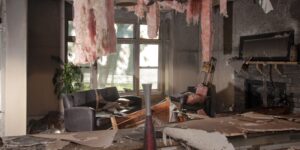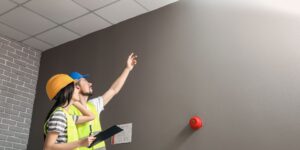Thousands of house fires occur annually in the United States, causing thousands of injuries, hundreds of deaths, and billions of dollars in property loss every year. Some flames occur because of natural causes or accidents, but many others can be avoided. In reality, your home’s fire risk can be drastically cut down with the right sorts of upgrades and regular upkeep. Causes of house fires and improvements that can be made to reduce the risk of flames are discussed here.
Causes of Most Home Fires
Let’s take a look at the leading causes of house fires before we start any home improvement tasks. The National Fire Protection Association (NFPA) reports that cooking equipment, heating devices, electrical distribution and lighting equipment, and smoking materials account for the majority of house fires in the United States.
When people leave their stoves unsupervised or don’t remove grease and other combustibles, fires can easily break out. Problems with chimneys, space heaters, or stoves can cause devastating house fires. When electrical systems are overloaded or damaged, fires can break out in the devices used to distribute and illuminate electricity. Cigarettes and cigars, among other smoking materials, represent a fire hazard if not disposed of properly.

Some of these factors are beyond our control, but we can mitigate others by making repairs and upgrades to our homes.
Fixing Up the House Efforts to Prevent Fires
Putting in smoke alarms
Installing smoke detectors is a crucial home improvement job for fire safety. With the help of smoke detectors, you can be warned of a fire in time to get out of the building securely. The National Fire Protection Association estimates that the likelihood of dying in a home fire can be reduced by half if functioning smoke detectors are installed.
Smoke detectors should be placed on every level of your house, especially near bedrooms and outside of sleeping areas. The batteries in your smoke alarms should be checked once a month and replaced at least once a year.
Electrification System Improvements
House fires are more likely to start in homes with outdated or broken electrical systems. Having a licensed electrician check your home’s wiring and electrical panel to make sure it’s up to code is a good idea if you live in an older house. Fixing persistent electrical problems like dim lights and tripped switches as soon as possible is essential.
Arc-fault circuit interrupters (AFCIs) and ground-fault circuit interrupters (GFCIs) can be installed to prevent electrical accidents. (GFCIs). These gadgets can identify potentially dangerous electrical currents and shut them off.
Implementing Fire-Resistant Construction
Installing fireproof features in your residence is another preventative measure you can take. To prevent a fire from spreading, you can switch to fireproof shingles for your roof or use treated wood for your porch and fence. Fabrics for drapery and upholstery that are impervious to flames are also available.
It is crucial to use fire-resistant materials and make a defensible space around your home if you happen to reside in a high-risk location for wildfires.
Dryer Vent Cleaning
When dryer vents become clogged with lint and other debris, clothes dryers are another frequent cause of house fires. Dryer fires can be prevented with routine dryer vent cleaning. You can do this by yourself by removing the dryer’s exhaust pipe and cleaning it with a vacuum or brush to get rid of any accumulated lint. A expert can also be hired to clean the vents for you.

Contrasting Do-It-Yourself and Expert Home Repair
While there are certainly do-it-yourself (DIY) house improvement tasks, there are also those that are best left to the pros. For example, if the job involves electricity, it must be done by a qualified technician. Similarly, you may want to hire experts to fix your roofing materials and upgrade your HVAC system.
It is essential to evaluate your level of expertise before beginning a home improvement project for fire safety purposes. Consult an expert if you have doubts about the feasibility or safety of an undertaking.
But there are many easy things you can do yourself to make your house safer from fire. Put in smoke alarms, maintain clean dryer vents, and replace flammable drapes and upholstery with fireproof alternatives.
The Value of Preventative Care
While renovations can greatly reduce the likelihood of flames occurring in the home, they still require regular upkeep. For instance, smoke detectors require yearly battery replacement and monthly testing. Regular checks of electrical systems are necessary to guarantee their safety and reliability. At least once a year, you should have your dryer’s exhaust cleaned.
The effectiveness and safety of your home renovations depend on your commitment to routine upkeep. It can also detect problems before they escalate.
Devastating as house fires can be, they are often avoidable through upgrades and upkeep. Reducing the likelihood of a house fire can be accomplished through the installation of smoke detectors, the updating of electrical systems, the use of fire-resistant materials, the cleaning of dryer vents, and other home renovation projects. Consider your level of expertise and training before beginning any major renovations on your house. Taking precautions against flames in the home can save lives and possessions.
